Related Research Articles

The Beach Boys are an American rock band formed in Hawthorne, California, in 1961. The group's original lineup consisted of brothers Brian, Dennis and Carl Wilson, their cousin Mike Love, and friend Al Jardine. Distinguished by its vocal harmonies, adolescent-oriented lyrics, and musical ingenuity, the band is one of the most influential acts of the rock era. The group drew on the music of older pop vocal groups, 1950s rock and roll, and black R&B to create its unique sound. Under Brian's direction, it often incorporated classical or jazz elements and unconventional recording techniques in innovative ways.

Brian Douglas Wilson is an American musician, singer, songwriter, and record producer who co-founded the Beach Boys. Often called a genius for his novel approaches to pop composition, extraordinary musical aptitude, and mastery of recording techniques, he is widely acknowledged as one of the most innovative and significant songwriters of the 20th century. His best-known work is distinguished for its high production values, complex harmonies and orchestrations, layered vocals, and introspective or ingenuous themes. Wilson is also known for his formerly high-ranged singing and lifelong struggles with mental illness.

Sunflower is the 16th studio album by the American rock band the Beach Boys, released on August 31, 1970 by Reprise Records, their first for the label. It received favorable reviews, but sold poorly, reaching number 151 on the US record charts during a four-week stay and becoming the lowest-charting Beach Boys album to that point. "Add Some Music to Your Day" was the only single that charted in the US, peaking at number 64. In the UK, the album peaked at number 29.
"California Girls" is a song by the American rock band the Beach Boys from their 1965 album Summer Days . Written by Brian Wilson and Mike Love, the lyrics were partly inspired by the band's experiences touring Europe for the first time, detailing an appreciation for women across the world. It was released as a single, backed with "Let Him Run Wild", and reached number 3 on the Billboard Hot 100. It was also a top 10 hit in several other countries, becoming one of the band's most successful songs globally.
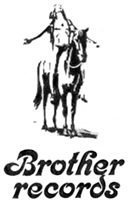
Brother Records, Inc. (BRI) is an American holding company and record label established in 1966 that owns the intellectual property rights of the Beach Boys, including "The Beach Boys" trademark. It was founded by brothers Brian, Carl and Dennis Wilson, and their cousin Mike Love. As of 2011, the corporation was equally owned by four shareholders and directors: Brian Wilson, Mike Love, Al Jardine, and the estate of Carl Wilson.

Friends is the fourteenth studio album by the American rock band the Beach Boys, released on June 24, 1968, through Capitol Records. The album is characterized by its calm and peaceful atmosphere, which contrasted the prevailing music trends of the time, and by its brevity, with five of its 12 tracks running less than two minutes long. It sold poorly, peaking at number 126 on the Billboard charts, the group's lowest U.S. chart performance to date, although it reached number 13 in the UK. Fans generally came to regard the album as one of the band's finest.

Carl and the Passions – "So Tough" is the 18th studio album by American rock band the Beach Boys, released May 15, 1972 on Brother/Reprise. The album is a significant musical departure for the band and is the first to feature the Flames' Blondie Chaplin and Ricky Fataar as additions to their official line-up. It sold poorly and was met with lukewarm reviews, but later gained stature as a cult favorite among fans.

15 Big Ones is the 20th studio album by the American rock band the Beach Boys, released July 5, 1976, by Brother/Reprise. It includes a mix of original songs and renditions of rock 'n' roll and R&B standards. The LP was the band's first album with production credited solely to Brian Wilson since Pet Sounds (1966). As such, its release was accompanied by a controversial media campaign that declared his comeback as an active member of the Beach Boys' recording and touring group.

The Beach Boys Love You is the 21st studio album by American rock band the Beach Boys, released April 11, 1977, on Brother/Reprise.

M.I.U. Album is the 22nd studio album by the American rock band the Beach Boys, released on September 25, 1978. Characterized for its easy-listening sound, the album was produced by Al Jardine and touring member Ron Altbach during one of the most acrimonious periods in the band's history. It sold poorly, peaking at number 151 in the U.S, and was met with confused reactions from critics and fans.
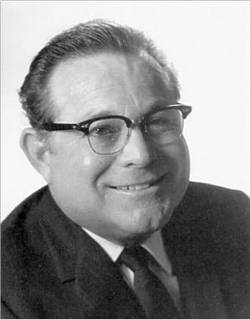
Murry Gage Wilson was an American songwriter, talent manager, record producer, and music publisher, best known as the father of the Beach Boys' Brian, Dennis, and Carl Wilson. After the band's formation in 1961, Murry became their first manager, and in 1962, he founded their publishing company, Sea of Tunes, with Brian. Later in his life, Wilson was accused of physically and verbally abusing his children, charges which he denied.
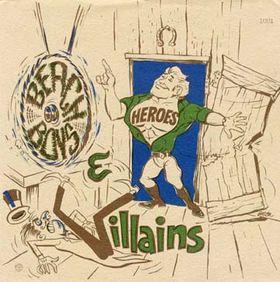
"Heroes and Villains" is a song by the American rock band the Beach Boys from their 1967 album Smiley Smile and their unfinished Smile project. Written by Brian Wilson and Van Dyke Parks, Wilson envisioned the song as an Old West-themed musical comedy that would surpass the recording and artistic achievements of "Good Vibrations". The single was Brother Records' first release. While it failed to meet critical and commercial expectations, it was nevertheless a hit record, peaking at number 12 in the U.S. and number 8 in the UK.

All Summer Long is the sixth album by the American rock band the Beach Boys, released July 13, 1964 on Capitol Records. Regarded as their first artistically unified collection of songs, as well as one of the first true concept albums, it marked the Beach Boys' first LP that was not focused on themes of cars or surfing. Instead, the songs are semi-autobiographical and relate to the experiences of a typical Southern Californian teenager, a theme encapsulated by the title track, "All Summer Long", and the often-imitated front cover, a modernist style photo collage depicting the band members fraternizing with young women on a beach.
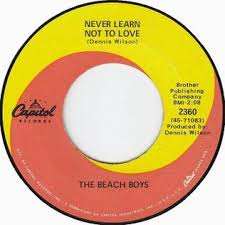
"Never Learn Not to Love" is a song recorded by the American rock band the Beach Boys that was issued as the B-side to their "Bluebirds over the Mountain" single on December 2, 1968. Credited to Dennis Wilson, the song is an altered version of "Cease to Exist", written by the Manson Family cult leader Charles Manson. The blues-inspired song was written specifically for the Beach Boys, with Manson's lyrics addressing personal tensions that he had witnessed between Dennis and his brothers Brian and Carl.

Marilyn Wilson-Rutherford is an American singer who is best known as the first wife of Beach Boys co-founder Brian Wilson. She was also a member of two girl groups, the Honeys in the 1960s and American Spring in the 1970s.
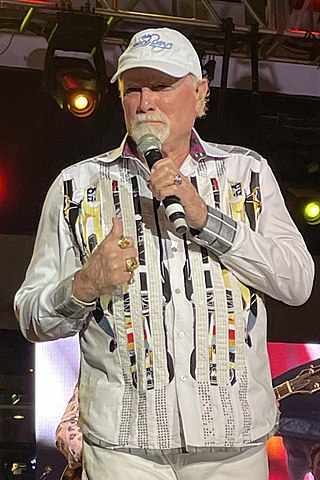
Michael Edward Love is an American singer and songwriter who was the lead vocalist of the Beach Boys which he co-founded with his cousins Brian, Dennis, and Carl Wilson and their friend Al Jardine. Characterized by his nasal tenor and occasional bass-baritone singing, Love has been one of the band's vocalists and lyricists for their entire career, contributing to each of their studio albums and serving as their frontman for live performances. During the mid-1960s, he was one of Brian's main collaborators, contributing lyrics to hit records such as "Fun, Fun, Fun" (1964), "I Get Around" (1964), "Help Me, Rhonda" (1965), "California Girls" (1965), and "Good Vibrations" (1966).

"I Get Around" is a song by American rock band the Beach Boys and the opening track from their 1964 album All Summer Long. Written by Brian Wilson and Mike Love, the autobiographical lyrics describe the group's reaction to their newfound fame and success, as well as their restlessness concerning the status quo, and their desire to find new places "where the kids are hip". It was released as a single on May 11, 1964, with the B-side "Don't Worry Baby".
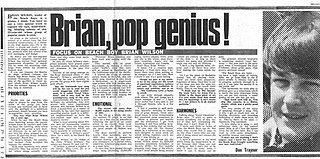
"Brian Wilson is a genius" is a line that became part of a media campaign spearheaded in 1966 by the Beatles' former press officer Derek Taylor, who was then employed as the Beach Boys' publicist. Although there are earlier documented expressions of the statement, Taylor frequently called Brian Wilson a "genius" as part of an effort to rebrand the Beach Boys and legitimize Wilson as a serious artist on a par with the Beatles and Bob Dylan.
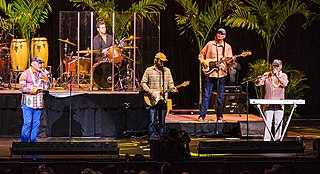
The Beach Boys are an American rock band formed in Hawthorne, California, in 1961. Since then, the band has undergone many variations in composition, with representation by fill-ins onstage. As of 2021, the only principal members included in the Beach Boys' touring band are co-founder Mike Love and 1965 addition Bruce Johnston.
"Surfin' U.S.A." is a song by the American rock band the Beach Boys, credited to Chuck Berry and Brian Wilson. It is a rewritten version of Berry's "Sweet Little Sixteen" set to new lyrics written by Wilson and an uncredited Mike Love. The song was released as a single on March 4, 1963, backed with "Shut Down". It was then placed as the opening track on their album of the same name.
References
Citations
- ↑ Badman 2004, p. 23.
- 1 2 Van Matre, Lynn (October 13, 1991). "Child Of Abuse: Beach Boy Brian Wilson Finally Tells His Story, And It Isn't Pretty". Chicago Tribune.
- ↑ Badman 2004, p. 95.
- 1 2 Badman 2004, p. 258.
- ↑ Wilson, Brian (May 31, 1969). "Why we're in such a struggle for cash". Disc & Music Echo . p. 7.
- ↑ Carlin 2006, p. 145.
- ↑ Love 2016, p. 226.
- ↑ Gaines 1986, p. 224–225.
- ↑ Love 2016, pp. 225–226, 376–377.
- ↑ Love 2016, p. 227.
- 1 2 3 4 5 "Beach Boys' Mike Love Wins His Case, Stands to Collect Millions". Los Angeles Times. December 13, 1994. Retrieved October 1, 2012.
- ↑ Letovski, Irv (September 19, 1989). "Brian Wilson Sues Music Publisher". Los Angeles Times . Retrieved September 17, 2011.
- ↑ Heller, Karen (October 23, 1991). "A Beach Boy's Blues For Brian Wilson, The Days Of "Fun, Fun, Fun" Have Ebbed. Although He Has A New Book, He's Also Involved In Several Lawsuits. "drugs," He Says, "put A Gash In My Mind."". The Philadelphia Inquirer . Archived from the original on December 22, 2015.
- ↑ "Beach Boy Wilson Sues Law Firm Over 1969 Sales". Los Angeles Times. September 18, 1990. Retrieved 2012-10-01.
- ↑ Bates, James (October 4, 1994). "COMPANY TOWN : No Harmony in Beach Boy Suit Between Cousins Love and Wilson". Los Angeles Times .
- 1 2 "Good Vibrations? The Beach Boys' Mike Love gets his turn". Goldmine . September 18, 1992.
- ↑ Love 2016, p. 373.
- ↑ Doe, Andrew G. "Album Archive". Bellagio 10452. Endless Summer Quarterly.
- ↑ Hedegaard, Erik (February 17, 2016). "The Ballad of Mike Love". Rolling Stone .
- ↑ Wilson, Brian (September 1974). "KRTH" (Interview: Audio). Interviewed by Jim Pewter. New York City.; Brian Wilson - Jim Pewter Interview 1974 (audio) on YouTube
- ↑ Dillon, Mark (2012). Fifty Sides of the Beach Boys: The Songs That Tell Their Story. ECW Press. p. 72. ISBN 978-1-77090-198-8.
- ↑ Carlin 2006, p. 278.
- ↑ Wilonsky, Robert (December 23, 1999). "The Forever Frown". Phoenix New Times Music. phoenixnewtimes.com. Retrieved July 29, 2013.
Bibliography
- Badman, Keith (2004). The Beach Boys: The Definitive Diary of America's Greatest Band, on Stage and in the Studio . Backbeat Books. ISBN 978-0-87930-818-6.
- Carlin, Peter Ames (2006). Catch a Wave: The Rise, Fall, and Redemption of the Beach Boys' Brian Wilson. Rodale. ISBN 978-1-59486-320-2.
- Gaines, Steven (1986). Heroes and Villains: The True Story of The Beach Boys. New York: Da Capo Press. ISBN 0306806479.
- Love, Mike (2016). Good Vibrations: My Life as a Beach Boy. Penguin Publishing Group. ISBN 978-0-698-40886-9.